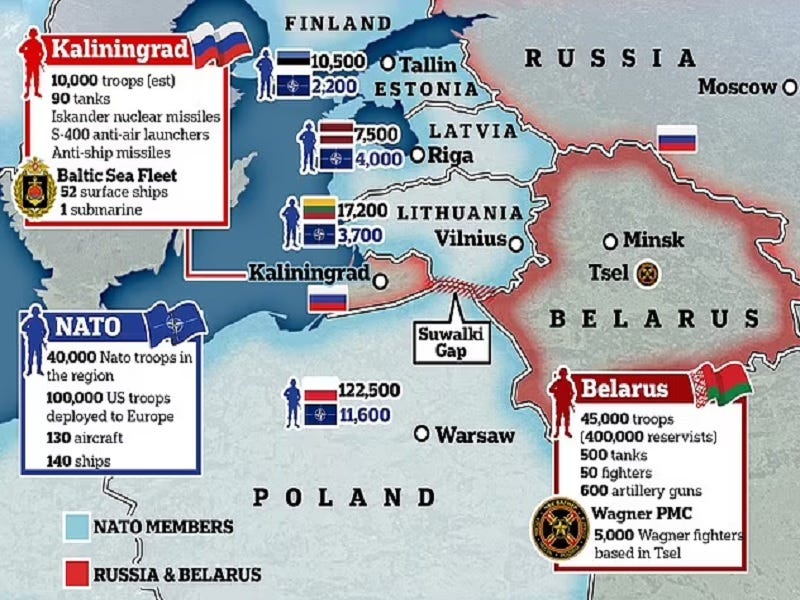Poland Might Exploit Wagner’s Presence In Belarus As The Pretext For Sabotaging Peace Talks
Wagner’s presence in Belarus serves as the perfect pretext for Poland and its Lithuanian ally to escalate tensions with Russia if they exploit it for the purpose of reimposing last summer’s de facto blockade of Kaliningrad so as to preempt the scenario of peace talks resuming by year’s end after Kiev’s counteroffensive stops.
Wagner’s post-mutiny deployment to Belarus prompted Poland to freak out after its Prime Minister fearmongered that this group is plotting to spark another weaponized migrant crisis and even try to infiltrate into his country under this cover. There are no credible reasons to suspect that this is in the cards, nor that Wagner wants to invade the Suwalki Corridor like some have also claimed. In fact, Poland is exploiting Wagner’s presence in Belarus as the pretext for advancing three of its strategic interests.
The first is that ruling party is purposely hyping up the imaginary threat posed by this group as part of its electioneering strategy exactly as former Prime Minister and current opposition leader Donald Tusk recently suggested. In his words, “It seems that PiS seeks the help of the Wagner Group because it fears the election.” By artificially manufacturing the perception of an unprecedented national security crisis, they hope to rally Poles around their rule in an attempt to retain power after mid-October’s elections.
The second strategic interest advanced on this pretext is that it serves to justify Poland’s preplanned military buildup along the Belarusian border. Russian Deputy Foreign Minister Mikhail Galuzin told TASS about this on Thursday, which aligns with what President Putin earlier warned about late last month. It remains unclear whether Poland’s creeping economic control over Western Ukraine will take a military form or not, but this buildup could precede and facilitate cross-border action if the order is given.
And lastly, the Polish Deputy Interior Minister said on Wednesday that his country and Lithuania might totally isolate Belarus by closing its railway crossings in response to Wagner’s alleged threat. This suggests that those two might be plotting a dangerous escalation in the NATO-Russian proxy war by imposing a de facto blockade on Kaliningrad like the one that Vilnius attempted last summer. In that event, the possible resumption of peace talks by year’s end might be delayed or outright derailed.
About that, these analyses here, here, and here argue why the failure of Kiev’s counteroffensive will likely be followed by a fresh round of diplomatic efforts to freeze the proxy war, which could also involve China and India alongside other leading Global South countries. Simply put, Russia’s growing lead in its “race of logistics”/“war of attrition” with NATO makes this outcome a fait accompli, but that could be precisely why Poland might try to preempt this scenario by de facto blockading Kaliningrad.
The insight shared above isn’t speculation like many in the Mainstream Media and even the Alt-Media Community might think due to how indoctrinated they’ve become since February 2022 by their respective side’s propaganda claiming that neither the US nor Russia want to freeze the conflict. The first is discredited by a Moscow Times report about informal US diplomatic efforts to this end and a recent piece from CNN about how Kiev’s failed counteroffensive could change the US’ strategic calculations.
As for the second, Russian Foreign Ministry spokeswoman Maria Zakharova denied her State Department counterpart’s claim earlier this week that the Kremlin isn’t interested in peace talks, which was followed by Galuzin then stipulating the criteria for resuming them. According to him, this is “possible only if the Kiev regime stops the hostilities and terrorist attacks, while its Western sponsors stop pumping up the Ukrainian military with weapons.”
He then repeated Russia’s other demands such as a return to Ukraine’s neutral status, the renunciation of its previously expressed interest in nuclear weapons, the recognition of new territorial realities, demilitarization, denazification, and the protection of minorities. Nevertheless, the first part of what he said about stopping hostilities and curtailing arms shipments to Ukraine can be interpreted as the real prerequisites for resuming peace talks aimed at politically achieving the other goals that he described.
These back-to-back statements from leading Russian diplomats coupled with the timing of CNN’s piece on the exact same week very strongly suggest that Moscow and Washington tacitly acknowledge that the conflict could freeze by year’s end after wintertime forces Kiev to stop its failed counteroffensive. Considering that this outcome isn’t in the interests of Polish ruling party or its Baltic allies like Lithuania, it therefore follows that they now have an urgent incentive to offset it via a manufactured crisis.
Wagner’s presence in Belarus serves as the perfect pretext for escalating tensions with Russia if they exploit it for the purpose of reimposing last summer’s de facto blockade of Kaliningrad so as to preempt the abovementioned scenario of resuming peace talks. They’d be going rogue by sabotaging their American patron’s speculative plans, which could open a can of worms that might exacerbate intra-NATO tensions with unpredictable consequences for Western unity in the New Cold War.



Is the beginning of negotiations not in Polish or Latvian interest because they want com